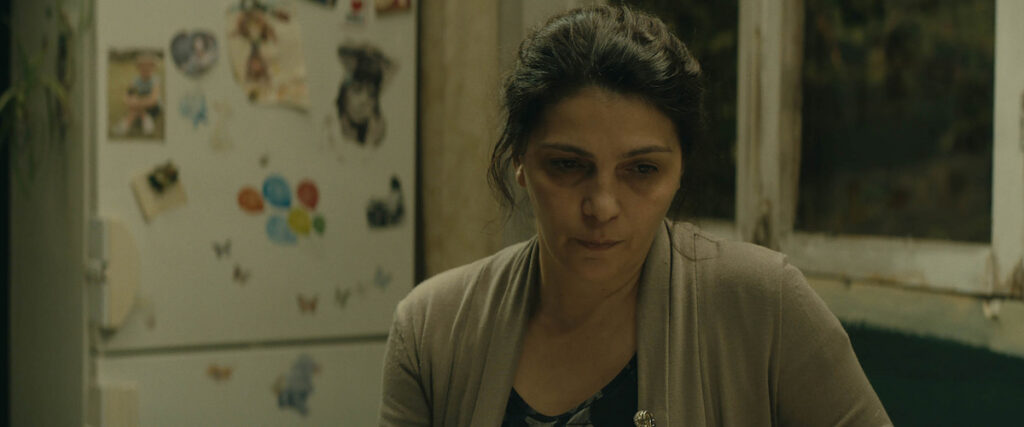The World Cinema Dramatic competition featured two world premieres today: from Georgia, directors Nana Ekvtimishvili & Simon Gross introduced the world to “My Happy Family”; from South Africa, co-writer/director John Trengove made his feature debut with “The Wound.”
Mixing the tension of “Krisha” with the domestic size of “My Big Fat Greek Wedding,” “My Happy Family” is the story of a woman—a daughter, wife and mother—trying to find some peace. In an act that might be cathartic to some viewers, Manana (Ia Shugliashvili) decides to move away from her family’s cramped Georgian apartment, which includes her son, daughter, husband and her parents. It maddens the family, especially as she provides no specific reason for leaving. In the opening scene, she looks at a dirty apartment and takes it; better than the cramped quarters of her family’s nest. The rest of the film is a gripping, fully-realized story about how impossible it is for a woman to separate from a family that relies on her for everything.
“My Happy Family” is a movie that volleys between extreme chaos and quiet. The scenes with Manana’s relatives are masterful presentations of family as an overwhelming experience. Characters overflow the close-up frame that follows Manana around the apartment, and the side conversations that accompany the main banter is inescapable. In a way that is not showy but displays just how masterfully directed these scenes are, the takes run for minutes longer than one might expect, as the ensemble moves in and out of the scene with nary a false note.
These claustrophobic (and organically produced) moments are then contrasted with the other energy of the film, its slow pace. After one family meeting, confrontational but not climactic, we then see Manana sitting in her apartment. The windows are open, the breeze is flowing, and she just sits there. Directors Nana Ekvtimishvili and Simon Gross don’t cut for a long time, and it’s a vital choice. We need the quiet as much as she does.
At the center of everything is Ia Shugliashvili’s incredible, intricate performance, even when the movie’s narrative seems to be about sharing intensity more instead of saying new things. She is someone constantly trying to find control, a sense of balance; to not let family get the best of her, even though her visits back to the apartment make things worse. There’s a point halfway in which she finds out news involving her family, something that everyone else knew but she hadn’t, and her silent reaction as she tries to just shrink away is completely heartbreaking. Of course, given the social intensity of this marvelous film, and the lack of control always threatening to crush Manana, she’s then forced to sing a song for a room full of people.

From South African director John Trengove comes “The Wound,” a rumination on the unnatural nature of repression, including both masculinity or sexual preference. It provides a unique perspective, using a circumcision tradition in the Xhosa tribe, which involves young men as “initiates” and older men looking over them. If there are certain story tropes within a tale of repression, particularly involving homosexuality, this movie checks off more than a few.
In this narrative, (co-written by Trengove), a factory worker named Xolani (Nakhane Touré) from Queenstown returns to the place where he had his own “Ulwaluko.” Xolani has been asked by a family friend from the city (Johannesburg, in this case) to take care of their son Kwanda (Niza Jay Ncoyini) who is said to spend time with his male friends behind locked doors. As Kwanda’s caregiver and supposed guide through what it is like to be a man, Xolani also faces his own relationship with another man, Vija (Bongile Mantsai), who is also private about his secret sexual preference, but is the most aggressive of the three to deny it. Xolani and Vija reconnect after a year apart from the last ceremony, while Xolani faces scrutiny from his peers for the rumors that spread about him.
The three leads all give solid performances, it’s just that the narrative puts their clear-cut dynamics on an expected dramatic course. “The Wound” suffers from a story that is best when observing, but lacks revelations within its own fiction. Trengove proves to be a capable filmmaker, as when he provides energy to the quickness of the circumcision ceremony, covering the frantic event in one take with slice sounds painting enough of a picture. It is all inspired to a drop-off point, but there’s enough hope for more original ideas in the future.












